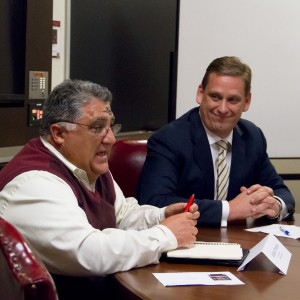Unruh Institute discusses state politics
The Jesse M. Unruh Institute of Politics, Political Student Assembly and Political Science Undergraduate Association partnered to present the second “California Politics Roundtable Discussion” Wednesday evening.

Dream team · Former Assemblyman Anthony Portantino (left) and former California State Senator Tony Strickland (right) discussed elections. – Austin Vogel | Daily Trojan
The conversation featured USC’s two legislators in residence: former State Senator Tony Strickland and former Assemblyman Anthony Portantino. Portantino, who also teaches a class at USC, has been interacting and mentoring students since he and Strickland began the program last year.
Strickland said midterm election season needs more attention from students because it can have a more direct impact on them than national elections.
“Every election cycle is important,” Strickland said. “A lot of times people don’t focus on midterm elections, most people just focus on the presidential — it’s extremely important who represents you — historically, midterms have a lot lower turnout so the fact of the matter is with so many young people who are going to be involved in the political process, I think that’s a positive.”
Portantino agreed, and pointed out that turnout in midterms is much lower than years in which there is also a presidential election. When it came to the issue of key congressional races, Portantino also said many elected officials have lost faith in the way politics functions at the national level.
“With gridlock the way it is, if you’re in the minority party, it’s not fun,” he said.
Because the deadline to declare a political candidacy in California for the upcoming elections closes soon, Wednesday night’s discussion could not have come at a more relevant time. Portantino and Strickland (who recently declared his candidacy for United States Congress), discussed prospects for the 2014 midterm elections that feature important races at California’s local, state and national offices.
For Tara Campbell, a junior majoring in political science and broadcast and digital journalism, the most valuable part of the discussion was the influence of party organizations following California’s institution of a top two open primary, which does away with “registered party only” primaries and allows everyone to vote to send the top two candidates, regardless of affiliation, to the general election.
“The fact that parties are probably going to start having internal fighting and have a line up system of, ‘It’s your time now, it’s your time now,’ is a scary concept for me because I want the best person at the time, not someone next in line,” Campbell said.
The seminar falls in line with the partnering organizations’ commitment to bringing politics closer to the students.
For Brandon Cheung, a sophomore majoring in political science, the seminar made elected officials much more human.
“I think it’s great that students get such direct access to two really influential guys,” he said. “And I think probably the most important thing about this is it shows us young people, who are disenchanted or disillusioned with the political system, how real these people are.”
Strickland urged students to take the enthusiasm inspired by the discussion and get involved.
“The barrier to get involved in government and politics is very simple: All you have to do is walk in and say, ‘I want to help,’” he said. “Whether you are a liberal or a conservative or in between a centrist, there are always candidates out there who would be eager to have them part of their coalition. All you have to do is show up.”

